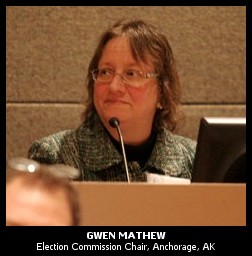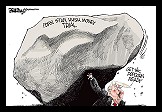 I know I shouldn't be, but I'm still amazed at the absolute cluelessness of far too many election officials. Yes, some of them are great, know exactly what they're talking about, and realize that the electronic voting systems we use in this nation --- every single one of them --- are complete garbage.
I know I shouldn't be, but I'm still amazed at the absolute cluelessness of far too many election officials. Yes, some of them are great, know exactly what they're talking about, and realize that the electronic voting systems we use in this nation --- every single one of them --- are complete garbage.
Last month, we reported on a recent Palm Beach County, FL, election in which the paper-ballot optical-scan system declared several losing candidates as the "winners." Thanks to the diligence the Supervisor of Elections Susan Bucher --- who told me when we spoke, "I don't want you to have to trust your election officials. I think your election officials have to prove it." --- the software failure on the Sequoia Voting Systems tabulator was discovered and the correct winners of the election were ultimately discovered via a 100% hand-count instead, weeks after the election.
Also last month, we highlighted two great election officials in Columbia County, NY where both the Democratic and Republican Election Commissioners are smart enough to refuse to rely on the electronic optical-scanners made by Dominion Voting that were forced on them by the state. They choose, instead, to count 100% of their paper ballots by hand.
"Since I, as election commissioner, have to certify to the accuracy of any election run under my watch, that steers me in the direction of a more elemental process --- a hand count under the watchful gaze of individuals who are invested in its accuracy," Democratic Commissioner Virginia Martin wrote in her must-read 2010 op-ed, explaining her refusal to rely on computer tabulated elections. The Republican Commissioner, Jason Nastke, agrees with his counterpart. "The most accurate and reliable method is a 100% visual audit," he told The Columbia Paper, "The machines are not completely reliable."
Late last year The BRAD BLOG reported in detail on the Interim Board of Elections (two Republicans, one Democrat) in Venango County, PA, who bucked their own County Commissioners and legal threats from ES&S, the nation's largest e-voting company, to have their 100% unverifiable touch-screen systems independently investigated after failures in several recent elections. The forensic study found the central tabulator had been "remotely accessed" by someone on "multiple occasions," including for 80 minutes on the night before the 2010 general election. As thanks, the commissioners were pushed out of their jobs before the investigation was completed. Asked why the County Commissioners and ES&S were so opposed to an independent forensic analysis by two Carnegie-Mellon computer scientists, the Republican Director of the Board, Craig Adams told me: "They know there's something wrong."
Those are just a few of the many great election officials I've had the pleasure of reporting on over the years, and the voters of their respective counties are very lucky to be served by them.
And then there are the election officials of Anchorage, Alaska, where, on April 3rd, there was another disastrous election, held on Diebold op-scan systems, in a state becoming known for its disastrous elections.
"Those are amazing machines - utterly amazing," Anchorage Election Commissioner Gwen Mathew told members of the Anchorage Assembly last Friday night during a working session as they tried to unravel the latest disaster.
"It is impossible for them to go haywire," she misinformed the law makers. "They are highly accurate. I think that I could almost say that they're totally accurate. I've never found a discrepancy."
"You can get as 'conspiracy theory' as you want," Anchorage's Deputy Municipal Clerk Jacqueline Duke said when I asked her about some of the many reported concerns about the validity of the election in Alaska on Monday. She seemed to have even more faith in the infallibility of the machines than Mathew...
Misinformation
The municipal election in early April including a Mayoral race and a number of ballot propositions. The most contentious was Prop 5, an initiative to extend anti-discrimination legal protections to the Lesbian, Gay, Bisexual, and Transgendered (LGBT) community.
Just days before the election, a poll [PDF] by the conservative firm of Dittman Research & Communications found the incumbent Republican Mayor Dan Sullivan likely to defeat his Democratic opponent Paul Honeman, 56% to 35%. The same poll, however, showed Prop 5 set to win 50% to 41% with 9% of respondents still undecided.
On the night of the election, Sullivan was reported as the winner of his race by the paper-ballot Diebold optical-scan systems. The margin was 59% to 38%, pretty close to the results Dittman had predicted. Several bond initiatives on the ballot also reportedly passed, by even larger margins.
Yet Prop 5 was said to have gone down in flames. According to the Diebold results that night, it lost 58% to 42% --- a full 25-point swing from Dittman's pre-election poll just days earlier.
For reasons I'll explain in a moment, however, the final results of the Prop 5 contest are still unknown, as thousands of ballots are still being tallied.
On Election Day, one of the key opponents of Prop 5, Jim Minnery of Protect Your Rights - Vote NO on 5, blasted out a message, incorrectly informing voters that they could both register and vote on the same day against Prop 5:
Another Minnery post [PDF] on Election Day read:
This information was entirely wrong, but as precincts throughout Anchorage began to run out of ballots all over the city in the later part of the day and into the evening, including almost all of the "questioned ballots" (that's what Alaska calls their provisional ballots, used for voters who vote at the wrong precinct, or who don't appear on the voter rolls), questions began to arise about Minnery's campaign.
Mel Green at the LGBT blog Bent Alaska, did some great reporting on this, including Minnery's claims that he was misinformed by an unnamed official at the Municipal Clerk's office. That, even though, as Green uncovered, Minnery had posted a notice 30 days earlier --- on the correct final day to register for the election --- informing fellow opponents of the anti-discrimination measure that "Sunday, March 4th is the LAST DAY you can register to vote in the April 3rd Election."
Minnery has removed his misinformation posts, though they are all available via Green's excellent report.
The damage was already done. There were a record number of questioned ballots used, perhaps due to unregistered voters answering Minnery's call to vote, who cast ballots that would never be counted, in the place of a registered voter who might have used that ballot to cast a legitimate vote.
A post-election investigation, which is still ongoing, found that a full 53 of Anchorage's 121 precincts completely ran out of ballots at some point on Election Day.
But Minnery's campaign isn't the only factor which some believe may have resulted in a shortage of ballots on April 3.
'This doesn't look like it's going to be enough'
 Turnout for the election, according to Anchorage's Deputy Municipal Clerk Jacqueline Duke, was just 29%, as the counting of questioned and absentee and photo-copied ballots, made during the emergency shortages at some precincts, continued on Monday.
Turnout for the election, according to Anchorage's Deputy Municipal Clerk Jacqueline Duke, was just 29%, as the counting of questioned and absentee and photo-copied ballots, made during the emergency shortages at some precincts, continued on Monday.
According to 28.40.010(b) of the Anchorage Municipal Election Code, "the municipal clerk shall ensure that ballots are prepared for at least 70 percent of the registered voters within each precinct to present all candidates and propositions to the voters."
Duke told me on Monday that the municipality did, in fact, print enough ballots for 70% of registered voters. So why did so many polling places run short of ballots, forcing poll-workers to instruct voters to go to the Airport or the University of Anchorage-Alaska (UAA) to cast an "absentee" ballot?
"There's really no mystery to it," Duke told me. "Just because you're required to order 70%, doesn't mean you're required to send 70% to each precinct."
Though the municipal code requiring enough ballots for 70% of the registered electorate "within each precinct," seems fairly clear, Duke doesn't see it that way, it seems.
But there does seem to be a mystery to it --- at least according to a number of poll workers who reported that, for some reason, there were a lot fewer ballots at their polling places for the April 3rd election than there were for previous elections.
Jeanne Devon and Linda Kellen Biegel of The Mudflats blog in Alaska, detailed the brouhaha that occurred over the election at an Anchorage Assembly meeting last Tuesday night. During the Public Comment period at the end of the evening, poll worker Susan Bretz offered what Devon and Biegel described as "the most jaw-dropping testimony of the night".
"In the morning when we came in and were setting up, I work the register so I'm getting everything together and they handed me the stack of ballots and set it down beside me. I was, like, where are the rest of them?," Bretz explained to the lawmakers.
"It was significantly fewer ballots than we've ever had before. We have 2,012 people registered in our precinct to vote. I've worked at the same precinct for almost four years, so I kind of got used to how many people come, and we've had over 500 people show up a couple of times. Not always, but a couple of times. They gave us 475 ballots to start with."
Bretz testimony went on to raise a number of other troubling issues, including the revelation that at one point, when the precinct had run out of ballots, they were told by the Municipal Clerk's office: "I don't think we have anymore ballots for you. Keep sending them to UAA", where, Bretz says, they were told to send the 70 or so voters they were forced to turn away, as word began to spread throughout the municipality that precincts had no more ballots.
She went on to explain that at 7:45pm, just fifteen minutes before the polls closed, "two people came in with a stack of 125 ballots for us." By then, however, the damage had been done. There is no way to know how many of those sent away were actually able to vote. There is no way to know how many didn't bother to show up once word got out that their precincts had run out of ballots.
In an affidavit from poll Chairman Collin Smith [PDF], as filed by the ACLU, a nearly identical story is told at another precinct: again, the poll worker reports beginning the day with "significantly fewer" ballots than in previous elections, and once again they were put off until just before the close off polls:
I spoke with yet another poll worker on Monday night, Karla Carpenter, who confirmed that her precinct also began the day with far fewer ballots than she recalls seeing in her ten years as a poll worker.
She noticed that things were different when she picked up the election materials several days before the election. She said she remembers thinking, "Oh, this box is lighter than usual."
Carpenter also says that Duke, who trained all of the pollworkers at four different sessions prior to the election, had actually indicated in advance that there would be fewer ballots sent to precincts this year.
"I can't give the exact quote," she told me. "It was a single sentence in the middle of a bunch of other sentences, but it was something like 'And you'll be happy to know that we're not gonna be distributing as many ballots as we usually do,' and I thought, 'Oh, good, cause we usually throw away a lot of ballots.'"
She says she didn't give the comment much more thought than that, until it became clear after the election that ballots had run out all over the city.
Carpenter says there are 1,200 registered voters at her precinct, but they began the day with just 475 ballots. "That doesn't make sense," she told me. When I told her that Duke said they had printed enough for 70% of voters, but didn't distribute them everywhere at those numbers, she said, "That doesn't make sense. They're not gonna do anybody any good sitting in the City Hall office."
"In hindsight, I should have raised my hand and said 'why aren't we gonna have more ballots?'," she says. "But at that moment in the training, I didn't think there was anything fishy going on."
Duke says that poll workers who claim she said there would be fewer ballots this year misinterpreted what she her comments during the training. She says she's "been misquoted many times" and that it "wouldn't make any sense" to distribute fewer ballots this year than in past years. That, in fact, precincts had more ballots in this election than in previous ones.
She believes the confusion is due to the fact that there were no "split-precincts" in the Mayoral election. Where there are often "split-precincts", requiring several different ballot styles, this time, everyone voted on the same ballot style.
"Sometimes people feel that way," Duke explained to me. "There are fewer styles, so people feel there are less ballots because there are less ballot boxes. I can understand why someone would feel that way, but there were more ballots this time than last."
"That's baloney!," Carpenter told me when I related Duke's explanation. "We clearly got many fewer ballots than we ever normally had in the past --- whether it was a federal, state or municipal election."
Did it just seem like fewer ballots because there was only one style? Or because her precinct nearly ran out?
"No. It was not a particularly high turnout," Carpenter said. "This was a very normal election. But that was the headline the next day, that there was a high turnout. But that was bullshit."
So how would a shortage of ballots make any difference to the over all election results? Wouldn't a shortage keep everyone, whether they were for or against Mayor Sullivan, or for or against Prop 5, from being able to cast their vote?
The Mudflats' Jeanne Devon says she believes that older, more conservative retired voters vote throughout the day. The younger, working class folks, who might be more inclined to vote against Sullivan and in favor of Prop 5, tend to show up after work and later into the evening...by the time many of the precincts had run entirely out of ballots.
The 'Utterly Amazing, Totally Accurate' Diebold Op-Scan Machines
Alaska's disastrous historical record with Diebold voting machines have been chronicled far too many times on the pages of The BRAD BLOG.
In a new report at The Mudflats on Sunday, headlined "Indications of Malfeasance and Election Fraud Surface in Anchorage", Devon and Biegel summarize just some of the state's most notable recent election disasters:
- George Bush received 190,889 votes according to the statewide summary. But, if you added up all the House district votes, he received 292,268 - a difference of 101,379 votes.
- Lisa Murkowski received 226,992 votes according to the statewide summary, but only 149,446 if you added up all the House district votes - a difference of 77,546 votes.
- Precincts across Alaska were reporting voter turnout exceeding 200%.
The Alaska Democratic Party was eventually forced to sue the state to obtain the Diebold databases to figure out what happened in 2004. The state originally had refused to turn over the materials, claiming the record of how Alaskans had voted was the proprietary property of Diebold. They later relented and agreed to turn over the databases, only to have the Homeland Security Office of then-Gov. Frank Murkowski (Senator Lisa's father) step in to claim it would be a "security risk" to release the data.
After more complaints to the state, and the state's consultation with Diebold, Alaska again agreed to release the information to the Democrats, but only after informing them that they'd have to cover the cost of (and this is a direct quote from their letter), "manipulating the data" before it could be released!
A lawsuit ensued, the Dems finally received the data, years later, but, as Devon and Beigel describe: "They discovered that when individuals entered the totals from the voting machines into the [Diebold] GEMS database, there was no code or key indicating who had entered the votes, or where they were coming from. The username in each case was 'admin' and the password was 'password.' The votes could never be reconciled, and we would never know why the numbers didn't add up."
Even worse, as one of Democratic attorneys would eventually explain, "One of the things we discovered was that you could hack into the GEMS database from a phone in Cleveland, and insert votes into it for an Alaska election."
That's just a tiny portion of Alaska's history with Diebold. Don't even ask me about Joe Miller and Lisa Murkowski's U.S. Senate race in 2010.
With all of that in mind, one might think election officials in Alaska, by now, would be particularly sensitive to the many documented concerns about Diebold voting machines, not just in their state, but across the entire country. If one would think that, however --- at least if my conversations with Duke and Mathew on Monday are any indication --- one would be dreadfully wrong.
In Devon and Biegel's Sunday report, they included what they described as a new "bombshell" revelation:
An election worker, Wendy Isbell, told them that during her training she was instructed, by Duke, that "if the seal over the memory card was broken when they picked up the Accu-Vote machine they should not be concerned. The seals break all the time."
Isbell reports that the seal on the Diebold Accuvote at her precinct was, in fact, broken when they began on Election Day.
Plastic seals over memory cards --- the extremely sensitive cartridges that hold the ballot design and track the election results tallied from the scanned paper ballots throughout the day --- became a mandatory security precaution in the wake of the shocking 2005 hack of a mock election in Leon County, FL which succeeded in completely flipping the results of the election in such a way that one would never know it had been manipulated unless all of the paper ballots were counted by hand.
That startling hack was accomplished by tampering with the memory card before the election. It was all captured on film in HBO's Emmy-nominated 2006 documentary Hacking Democracy. Here's the actual hack, as it happened, as seen in the film...
In the state of California, where a review of the Diebold Accuvote op-scan system was commissioned by the Sec. of State after the Leon County hack, a team of computer scientists and security experts from the University of California, Berkley confirmed the vulnerability discovered in Florida, along with 16 "more serious vulnerabilities...that go well beyond" the Leon County hack. The problems were regarded by election integrity experts at the time as "a major national security issue."
But neither Duke --- who worked directly for Mayor Sullivan (who was said to have been re-elected on April 3rd) before she moved to the Municipal Clerk's office (she worked for Chili's Grill & Bar in Anchorage before that, according to her resume [PDF]) --- nor Election Commission Chair Gwen Mathew, have any such concerns about any vulnerabilities in Diebold machines.
Duke confirmed to me that she had instructed poll workers not to worry if security seals on memory cards are found broken when setting up machines on Election Day.
"They come sealed in the Accuvote cases and often times in transit they bust off because they're the flimsiest pieces of plastic ever," she told me. Sometimes that leads poll workers to "freak out."
She tells them that if they "open the case and can obviously tell the broken seal was from transport, you do not have to be worried. There are more in your supplies."
Duke instructs the workers to "re-seal it, and then run the zero report tape" to "confirm that your poll count is zero."
Yet in the Leon County hack, as seen in Hacking Democracy, the zero report tape before the mock election also showed that the poll count was zero. That's because when the memory card was hacked before the mock election, the "No" votes were set to -5 and the "Yes" votes were set to +5; thus, when the machine reported how many votes were already on it at the beginning of the election, the answer came back as 0. That's how the mock election was flipped. The results to the mock election question about whether Diebold machines could be hacked via their memory cards were completely flipped when the "Yes" votes were reduced by 5 and the "No" votes were increased by 5.
When I asked Duke if she'd seen Hacking Democracy she flatly stated "no."
"We don't talk to them [poll workers] about conspiracy theories or about how Diebold machines were hacked."
She insisted the memory cards were not accessible during the election, so no "voters" could possibly access them during the day.
"No one has access to the memory cards," she explained. "Only the Municipal Board staff, the Testing Board and then, theoretically, they are locked after that."
She then confirmed that the Accuvotes are sent home for days before the election with poll workers, who have unfettered access to the machines and the memory cards before transporting them to the polls on Election Day.
This blog is credited with coining the phrase "voting machine sleepover" to describe that practice. Our coverage of "sleepovers" in the San Diego, CA special election to replace the disgraced Rep. Duke Cunningham led the Democratic Party, at the time, to call for a full hand-count of the election after it became clear that the "sleepovers" violated both state and federal restrictions on the voting machines instituted after the Leon County hack. Many jurisdictions have since found other ways to distribute machines to the polls on Election Day, in light of our reports on the security vulnerability the practice presents.
Duke hadn't heard of any such concerns: "The state does that, the city does it, I don't know of any jurisdiction that doesn't."
If a poll worker tampers with a machine and breaks the security seals to do so, presumably it's no problem, according to Duke. They're instructed to simply put another seal over it on election morning --- instead of taking the machines out of service, as is required in California and other jurisdictions in the event of a broken memory seal --- run a zero test, and then get on with the election.
Paper ballots are never checked by hand afterwards, as would be required to discover if such a hack has taken place.
The findings of the post-Leon County Security Analysis in California [PDF] revealed, among other things:
The analysis went on to warn that the hacker "was indeed able to change the election results by doing nothing more than modifying the contents of a memory card."
"It would be safest if it is not widely used until these bugs are fixed (they never were) and until a modification is made to ensure that the...attack is eliminated." The scientists wrote that "strong procedural safeguards should be implemented that prevent anyone from gaining unsupervised or undocumented access to a memory card, and these procedures should be maintained for the life of all cards. ... Any breach of control over a card should require that its contents be zeroed (in the presence of two people) before it is used again."
"There would be no way to know that any of these attacks occurred; the canvass procedure would not detect any anomalies, and would just produce incorrect results. The only way to detect and correct the problem would be by recount of the original paper ballots," they found.
According to the Verifier Database at the non-partisan e-voting watchdog site VerifiedVoting.org, the Diebold Accuvote op-scan system is used in more than 1,000 jurisdictions in the U.S., across all or parts of 24 different states. Of course, it will be used once again to tally paper ballots for the 2012 Presidential Election in all or parts of Alaska, Arizona, California, Colorado, Connecticut, Delaware, Florida, Iowa, Illinois, Indiana, Kansas, Massachusetts, Maryland, Maine, Michigan, Minnesota, Missouri, Mississippi, New Hampshire, Tennessee, Texas, Virginia, Wisconsin (including in next month's recall elections) and Wyoming.
Duke was not familiar with the California study cited above, or the many others of the same system, all finding equally disturbing vulnerabilities --- and worse. "You can get as 'conspiracy theory' as you want," she told me, but she had no concerns whatsoever.
 Neither did Gwen Mathew, who told the Anchorage Assembly on Friday that the Diebold Accuvotes "are amazing machines - utterly amazing. ... It is impossible for them to go haywire. ... We have tested each and every one of those machines, every year ... They are highly accurate. I think that I could almost say that they're totally accurate. I've never found a discrepancy."
Neither did Gwen Mathew, who told the Anchorage Assembly on Friday that the Diebold Accuvotes "are amazing machines - utterly amazing. ... It is impossible for them to go haywire. ... We have tested each and every one of those machines, every year ... They are highly accurate. I think that I could almost say that they're totally accurate. I've never found a discrepancy."
This is Mathew's first year as Chair of the Election Commission. Prior to her new role she was Chair of Anchorage's Accuvote Testing Commission "for probably five or seven years." She told me that had not read any of the security reports on the myriad vulnerabilities of the Diebold voting system. She hadn't seen Hacking Democracy either. She had no concerns whatsoever about broken seals on memory cards.
"They are kept in a locked room. Only the staff has access to them. It would be virtually impossible for someone to go in there and pop the seals," she explained.
She had no concerns about "the staff" having access either, apparently. Nor about the voting machine "sleepovers".
"They run a tape the first thing in the morning, so they can tell if they have a zero count and that is signed by all precinct workers," she says. And that's good enough for election official work in Anchorage, apparently.
I was quoted in the Sunday article by Devon and Biegel a number of times. In response to Mathew's comments I had said: "Anybody who says it’s 'impossible' for these machines to fail either knows absolutely nothing about how these machines work or is simply lying. I don’t know Ms. Mathew, so I won’t guess which one of those two things is true, but I promise you one of them is."
After speaking with Mathew, I'll put my money on the former. She knows absolutely nothing about the voting system she is charged by her municipality with overseeing. Nothing. And thanks to the carelessness and horrendous procedures by elections officials like Duke and Mathew --- a full six years after the world has learned, over and again, what neither of them apparently cared to find out --- the voters of Anchorage now have no idea if their own elections are legitimate.
"We say we believe in Democracy," poll worker Karla Carpenter told me at the end of our conversation yesterday. "If we do, we shouldn't just give it lip service. The mayor should be horrified, but he's not. He won the election, so he doesn't care. He says it's not a big deal. But it's a huge deal, if we believe in this system of governance."
The Anchorage Assembly meets again tonight to decide if a special investigator should be assigned to look into the April 3rd election, or whether the Municipal Attorney, who serves at the pleasure of the Mayor who reportedly won handily during the same election, will suffice. They must decide whether the results should be certified as is --- the deadline for certification was supposed to be tonight, but ballots that couldn't be counted by the machines are still being tallied --- or whether a special "do over" election should instead be run.


 'Election Fraud, Pure and Simple': 'BradCast' 4/23/24
'Election Fraud, Pure and Simple': 'BradCast' 4/23/24 'Green News Report' 4/23/24
'Green News Report' 4/23/24
 'First Domino Falls' in UAW Effort to Unionize the South: 'BradCast' 4/22/24
'First Domino Falls' in UAW Effort to Unionize the South: 'BradCast' 4/22/24 Sunday 'Popcorn Ready' Toons
Sunday 'Popcorn Ready' Toons Bad Climate News for Home, Car Owners; Good Labor News for Workers in the South: 'BradCast' 4/18/24
Bad Climate News for Home, Car Owners; Good Labor News for Workers in the South: 'BradCast' 4/18/24 'Green News Report' 4/18/24
'Green News Report' 4/18/24 SCOTUS Suddenly Worried About Overcriminalization ... for J6 Insurrectionists: 'BradCast' 4/17/24
SCOTUS Suddenly Worried About Overcriminalization ... for J6 Insurrectionists: 'BradCast' 4/17/24 'Trump Media' Plummeting, MAGA Buyers Losing Life Savings: 'BradCast' 4/16/24
'Trump Media' Plummeting, MAGA Buyers Losing Life Savings: 'BradCast' 4/16/24 'Green News Report' 4/16/24
'Green News Report' 4/16/24 Trump's First Criminal Trial, for Cheating in 2016, Begins in NY: 'BradCast' 4/15/24
Trump's First Criminal Trial, for Cheating in 2016, Begins in NY: 'BradCast' 4/15/24 Sunday 'Party Like It's 1864' Toons
Sunday 'Party Like It's 1864' Toons Biden Closes 'Gun Show Loophole'; Repubs Turn Desperate: 'BradCast' 4/11/24
Biden Closes 'Gun Show Loophole'; Repubs Turn Desperate: 'BradCast' 4/11/24 'Green News Report' 4/11/24
'Green News Report' 4/11/24 'Pink Slime': Fake 'Local News' Sites Proliferating in Advance of Election: 'BradCast' 4/10/24
'Pink Slime': Fake 'Local News' Sites Proliferating in Advance of Election: 'BradCast' 4/10/24 Dirty Tricks and the Dirtiest Candidate Of All Time: 'BradCast' 4/9/24
Dirty Tricks and the Dirtiest Candidate Of All Time: 'BradCast' 4/9/24 'Titanic Law' Reform Just Tip of Iceberg in Quest for Key Bridge Accountability: 'BradCast' 4/8/24
'Titanic Law' Reform Just Tip of Iceberg in Quest for Key Bridge Accountability: 'BradCast' 4/8/24 Trump's Very Bad Day in Court(s), Other Good (& Less Good) News: 'BradCast' 4/424
Trump's Very Bad Day in Court(s), Other Good (& Less Good) News: 'BradCast' 4/424 WI Supremes May Restore Drop-Box Voting
WI Supremes May Restore Drop-Box Voting WI Voters Approve Election Crippling Ballot Measures: 'BradCast' 4/3/24
WI Voters Approve Election Crippling Ballot Measures: 'BradCast' 4/3/24 Politico's Josh Gerstein Owes a Retraction
Politico's Josh Gerstein Owes a Retraction More GOP Election Fraud; Overdue Justice for Crystal Mason: 'BradCast' 4/2/24
More GOP Election Fraud; Overdue Justice for Crystal Mason: 'BradCast' 4/2/24
 VA GOP VOTER REG FRAUDSTER OFF HOOK
VA GOP VOTER REG FRAUDSTER OFF HOOK Criminal GOP Voter Registration Fraud Probe Expanding in VA
Criminal GOP Voter Registration Fraud Probe Expanding in VA DOJ PROBE SOUGHT AFTER VA ARREST
DOJ PROBE SOUGHT AFTER VA ARREST Arrest in VA: GOP Voter Reg Scandal Widens
Arrest in VA: GOP Voter Reg Scandal Widens ALL TOGETHER: ROVE, SPROUL, KOCHS, RNC
ALL TOGETHER: ROVE, SPROUL, KOCHS, RNC LATimes: RNC's 'Fired' Sproul Working for Repubs in 'as Many as 30 States'
LATimes: RNC's 'Fired' Sproul Working for Repubs in 'as Many as 30 States' 'Fired' Sproul Group 'Cloned', Still Working for Republicans in At Least 10 States
'Fired' Sproul Group 'Cloned', Still Working for Republicans in At Least 10 States FINALLY: FOX ON GOP REG FRAUD SCANDAL
FINALLY: FOX ON GOP REG FRAUD SCANDAL COLORADO FOLLOWS FLORIDA WITH GOP CRIMINAL INVESTIGATION
COLORADO FOLLOWS FLORIDA WITH GOP CRIMINAL INVESTIGATION CRIMINAL PROBE LAUNCHED INTO GOP VOTER REGISTRATION FRAUD SCANDAL IN FL
CRIMINAL PROBE LAUNCHED INTO GOP VOTER REGISTRATION FRAUD SCANDAL IN FL Brad Breaks PA Photo ID & GOP Registration Fraud Scandal News on Hartmann TV
Brad Breaks PA Photo ID & GOP Registration Fraud Scandal News on Hartmann TV  CAUGHT ON TAPE: COORDINATED NATIONWIDE GOP VOTER REG SCAM
CAUGHT ON TAPE: COORDINATED NATIONWIDE GOP VOTER REG SCAM CRIMINAL ELECTION FRAUD COMPLAINT FILED AGAINST GOP 'FRAUD' FIRM
CRIMINAL ELECTION FRAUD COMPLAINT FILED AGAINST GOP 'FRAUD' FIRM RICK SCOTT GETS ROLLED IN GOP REGISTRATION FRAUD SCANDAL
RICK SCOTT GETS ROLLED IN GOP REGISTRATION FRAUD SCANDAL VIDEO: Brad Breaks GOP Reg Fraud Scandal on Hartmann TV
VIDEO: Brad Breaks GOP Reg Fraud Scandal on Hartmann TV RNC FIRES NATIONAL VOTER REGISTRATION FIRM FOR FRAUD
RNC FIRES NATIONAL VOTER REGISTRATION FIRM FOR FRAUD EXCLUSIVE: Intvw w/ FL Official Who First Discovered GOP Reg Fraud
EXCLUSIVE: Intvw w/ FL Official Who First Discovered GOP Reg Fraud GOP REGISTRATION FRAUD FOUND IN FL
GOP REGISTRATION FRAUD FOUND IN FL


































